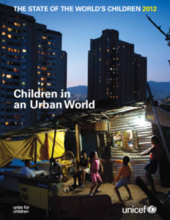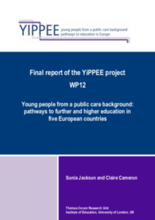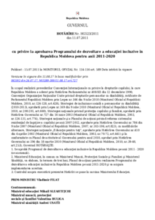Displaying 281 - 290 of 350
This paper presents new estimates of the average lifetime cost per child maltreatment (CM) victim in the United States and aggregate lifetime costs for all new cases of CM incurred in 2008 using an incidence-based approach. The authors find that the lifetime economic burden of CM is approximately $124 billion. Given this substantial economic burden, the authors argue that the benefits of prevention will likely outweigh the costs for effective programs.
This paper uses a large nationally representative survey data to examine the impact of China's rural–urban migration on high school attendance of left-behind children by disentangling the effect of remittances from that of migration.
This report provides data on children living in urban settings, including statistics, conditions, and personal testimonies. The report also includes UNICEF’s recommendations for policy regarding children in urban settings, working with this population, and for future action. Sections that are relevant to children’s care include: children living and working on the streets, migrant children, urban emergencies, and many more.
This article, from the Children and Youth Services Review special issue on ‘Young People's Transitions from Care to Adulthood’ examines the school performance and psychosocial wellbeing of care leavers in Sweden.
This document analyses the review of 43 impact studies sought to methodically capture the known impacts of economic strengthening programs on the well-being of children (0-18 years) in crisis contexts in low-income countries.
Child care and early education policies may not only raise average achievement but may also be of special benefit for less advantaged children, in particular if programs are high quality. We test whether high quality child care is equalizing using rich longitudinal data from two comparison countries, Denmark and the United States.
Parental leave and early childhood education and care have gained a high profile in child and family policy fields, and both have been the subject of substantial cross-national mapping, describing and comparing their main features across a range of countries. This article provides overviews on parental leave and early childhood services in affluent countries, and reflections on this mapping.
The first comparative study of young people who have been in state care as children and their post-compulsory education, was undertaken by a team of cross-national researchers.
The first ever World report on disability, produced jointly by WHO and the World Bank, suggests that more than a billion people in the world today experience disability. This report provides the best available evidence about what works to overcome barriers to health care, rehabilitation, education, employment, and support services, and to create the environments which will enable people with disabilities to flourish. The report ends with a concrete set of recommended actions for governments and their partners.
În scopul realizării prevederilor Convenţiei Internaţionale cu privire la drepturile copilului, la care Republica Moldova a aderat prin Hotărîrea Parlamentului nr.408-XII din 12 decembrie 1990, Convenţiei Organizaţiei Naţiunilor Unite privind drep




